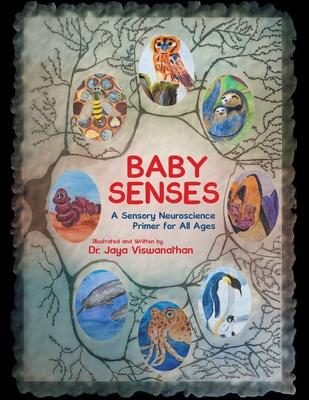From industrious ants to mischievous whales, sensing, understanding, and responding appropriately to the world is an essential life function. Throughout millions of years, the nervous system has evolved to perform the crucial function of interpreting the world in various animal species based on the unique challenges they faced in different environments. Drawing simultaneously from contemporary research on sensory and perceptual mechanisms as well as historical documentation of the anatomy of sensory systems, Baby Senses, by author Dr. Jaya Viswanathan, provides a unique window into the marvels of sensory perceptions that is appealing to children and curious adults. Baby Senses highlights sixteen systems that span the traditional five human senses, internal sensory systems that help animals maintain internal stability, and exotic systems like those that enable animals to sense electrical and magnetic fields or see polarized light. The neuroscience paintings included illustrate a world normally only accessible through a microscope to scientists or in technical scientific articles and textbooks.

Baby Senses: A Sensory Neuroscience Primer for All Ages
From industrious ants to mischievous whales, sensing, understanding, and responding appropriately to the world is an essential life function. Throughout millions of years, the nervous system has evolved to perform the crucial function of interpreting the world in various animal species based on the unique challenges they faced in different environments. Drawing simultaneously from contemporary research on sensory and perceptual mechanisms as well as historical documentation of the anatomy of sensory systems, Baby Senses, by author Dr. Jaya Viswanathan, provides a unique window into the marvels of sensory perceptions that is appealing to children and curious adults. Baby Senses highlights sixteen systems that span the traditional five human senses, internal sensory systems that help animals maintain internal stability, and exotic systems like those that enable animals to sense electrical and magnetic fields or see polarized light. The neuroscience paintings included illustrate a world normally only accessible through a microscope to scientists or in technical scientific articles and textbooks.